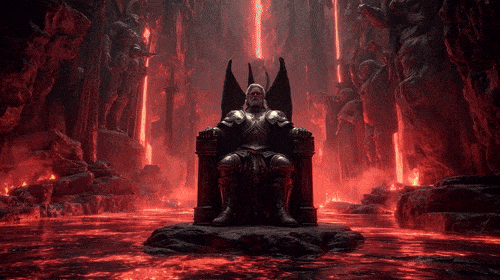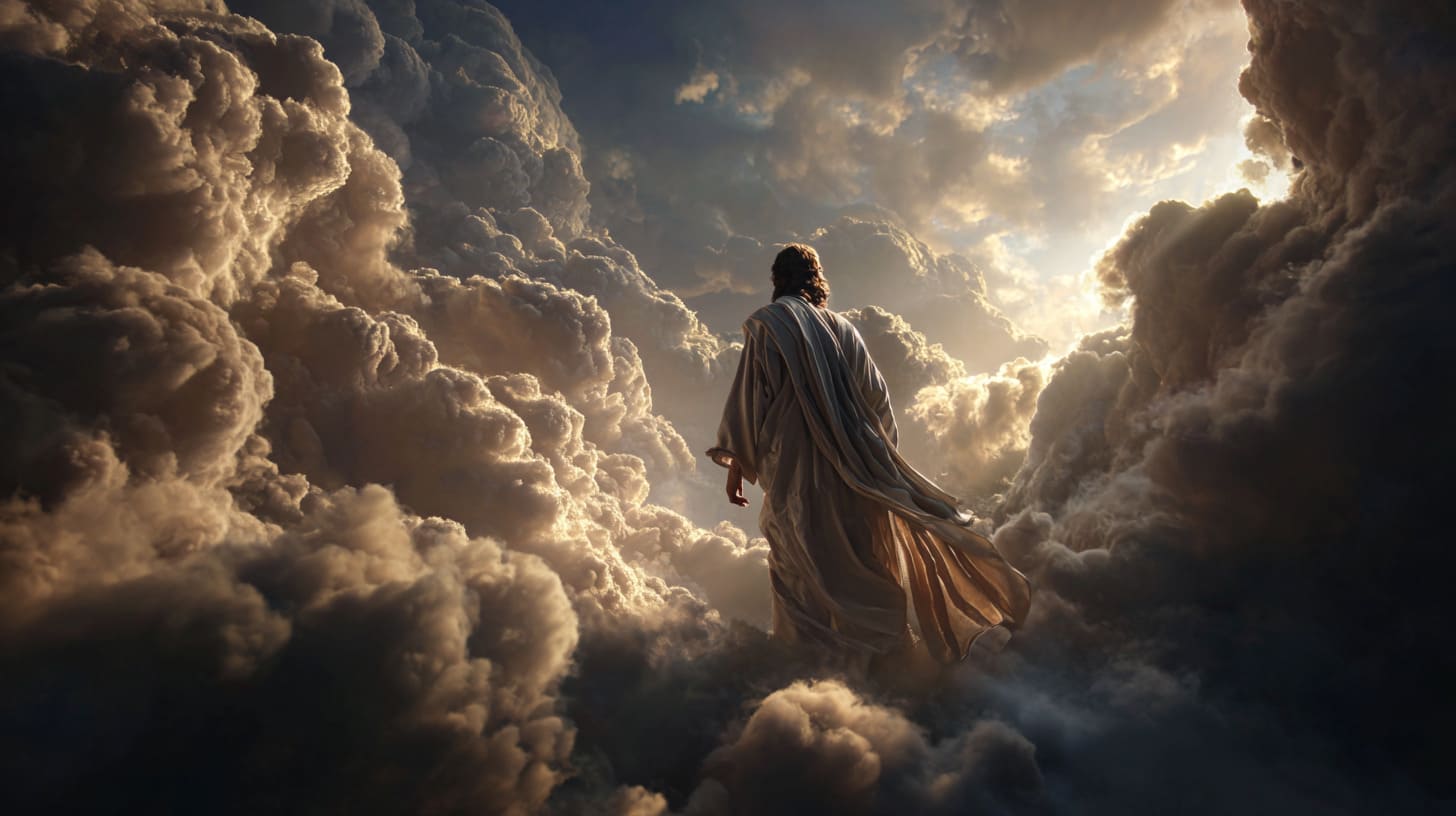
Before the first sunrise, before the first breath of wind across primordial waters, there was worship in heaven.
Perfect harmony. Angelic voices in flawless chorus.
And among them, there was one being who outshone them all. He was beautiful, powerful, and beloved.
Until he wasn't.
Lucifer’s fall from heaven is one of Scripture's most dramatic moments.
We picture it cinematically: a cosmic battle, lightning splitting the heavens, a rebel angel cast down in flames while loyal angels look on in horror.
But here's the problem: the Bible never gives us that scene. Not directly, anyway.
Instead, we get glimpses. Cryptic verses. Poetic fragments. Prophetic visions that may or may not be describing what happened before Genesis 1:1.
So when did Satan fall? Why did he rebel? And how did it actually happen?
The honest answer: We're piecing together a puzzle with missing pieces.

Most Christians know the story: Lucifer, the "light-bearer," the most beautiful angel, rebelled against God out of pride and was cast from heaven.
But here's what might surprise you: The name "Lucifer" appears exactly once in most English Bibles, and it's not even talking about Satan directly.
Isaiah 14:12 says: "How you have fallen from heaven, morning star, son of the dawn! You have been cast down to the earth, you who once laid low the nations!"
The Hebrew word is helel, meaning "shining one" or "morning star." The Latin Vulgate translated it as Lucifer.
But Isaiah is writing a taunt-song against the king of Babylon: a human tyrant whose pride led to his downfall.
Was Isaiah also describing Satan's fall through prophetic double meaning?
Many theologians say yes. The language seems too cosmic, too grand for just a human king. The imagery of falling from heaven, shaking nations, aspiring to be like God echoes what we see in other portions of Scripture.
Ezekiel 28:12-17 describes the "king of Tyre" in supernatural terms:
"You were the seal of perfection, full of wisdom and perfect in beauty. You were in Eden, the garden of God...You were anointed as a guardian cherub...You were blameless in your ways from the day you were created till wickedness was found in you...So I drove you in disgrace from the mount of God."
Again, we have a human king being described in language that seems angelic.
The early church fathers believed these passages revealed Satan's backstory through prophetic layers. In their view, the early kings provided flesh and bone to the spiritual story of Satan’s fall.
Then there's Revelation 12:7-9, which describes a war in heaven:
"Michael and his angels fought against the dragon, and the dragon and his angels fought back. But he was not strong enough, and they lost their place in heaven. The great dragon was hurled down—that ancient serpent called the devil, or Satan, who leads the whole world astray."
And Jesus Himself said: "I saw Satan fall like lightning from heaven" (Luke 10:18).
So Scripture speaks of the fall. But when it happened? That's where it gets complicated.

Over the centuries, theologians have proposed three main timelines for Satan's fall. Let's unpack them:
View 1: The Prehistoric Fall (Before Genesis 1:1)
This is the most popular view. Satan rebelled in the beginning, before creation was complete or even before humanity was made.
Evidence:
This view envisions Satan's fall occurring as a rebellion among the heavenly host that sets the cosmic conflict in motion before Adam ever draws breath.
View 2: The Fall During Eden (Between Genesis 2 and 3)
Some scholars argue that Satan’s fall happened during the Genesis narrative, not before it.
Evidence:
This view sees Satan's fall as simultaneous with humanity's fall.
View 3: The Ongoing/Future Fall (Symbolic of Multiple Events)
A third view suggests "Satan's fall" isn't one moment but multiple defeats:
Evidence:
This view sees Satan's fall as a progressive stripping of power—he's been falling ever since he first rebelled and will continue falling until his ultimate destruction.
Honestly? We don't have a clear answer.
What we do know is this: Satan rebelled. He fell. And he's been at war with God and humanity ever since.
WE'RE ANIMATING OUR NEWSLETTERS!
Check them out before anyone else by going to our channel at PRAY.COM
Plus, you'll find more resources to build your faith, right from your phone.

Let's clear up some popular misconceptions:
Myth 1: Satan was once God's equal and challenged Him to a fair fight.
Scripture never suggests this. Satan is a created being. He’s a powerful angel, yes, but a creature nonetheless.
The closest example we see to a battle of angelic equals is Michael the Archangel against Satan. But even then, Michael owns Satan like a newb.
God doesn't struggle against Satan. He tolerates him, for a time, for purposes we don't fully understand.
Myth 2: Satan rules hell.
Popular culture loves this image: Satan on a throne in hell, commanding demons, torturing souls. But Scripture says the opposite. Hell (the lake of fire) was "prepared for the devil and his angels" (Matthew 25:41).
Hell is Satan's prison, not his kingdom.
Revelation 20:10 says he will be "thrown into the lake of burning sulfur" where he "will be tormented day and night forever."
Satan isn't hell's warden. He's its most infamous inmate.
Myth 3: A third of the angels fell with Satan.
This comes from Revelation 12:4, which describes the dragon's "tail sweep[ing] a third of the stars out of the sky."
Many interpret "stars" as angels. It's possible.
But Revelation is apocalyptic literature, filled with symbolic imagery. A third might be literal. It might be metaphorical.
We don't know the exact number of fallen angels, and honestly? It doesn't change the reality: some angels chose rebellion, and they're now aligned with Satan against God.
THE REAL POINT: Why Did He Fall?
Scripture gives us one clear answer to the "why" question: pride.
Isaiah 14:13-14 captures the heart of Satan's rebellion: "You said in your heart, 'I will ascend to the heavens; I will raise my throne above the stars of God...I will make myself like the Most High.'"
Five "I will" statements. Five declarations of autonomy. Five attempts to dethrone God.
Satan's sin wasn't hatred. It was ambition.
He didn't reject God because God was cruel or unjust. He rejected God because he wanted to be God.
This is the original temptation, the first sin, the root of all rebellion: the delusion that we can exist independently of our Creator, that we can define truth for ourselves, that we deserve worship rather than giving it.
And here's the chilling part: Satan offered that same delusion to Eve.
"You will be like God," the serpent whispered (Genesis 3:5).
It was the same lie that destroyed him. And humanity bit.
Whether Satan fell before Genesis 1 or during Genesis 3, his sin and ours are mirrors of each other: pride, autonomy, and the desire to be our own gods.
Today, we face the same temptation Satan did.
Every day, we're offered the chance to say "I will" in defiance of God's "You shall."
Satan's fall began with those words. And every human fall since has echoed them.
But here's the difference: Satan had perfect knowledge. He stood in God's presence. He knew exactly what he was rejecting. And he did it anyway.
We, on the other hand, are fallen creatures in a broken world, born into the fog of sin. Our rebellion is real, but it's also inherited. We're not solely rebels; we're also victims of the first rebellion.
And that's where the Gospel enters.
Where Satan fell through pride, Jesus descended through humility.
Philippians 2:6-8 says: "Who, being in very nature God, did not consider equality with God something to be used to his own advantage; rather, he made himself nothing...he humbled himself by becoming obedient to death—even death on a cross!"
Satan wanted to ascend to God's throne. Jesus descended from it.
Satan said, "I will be like the Most High." Jesus said, "Not my will, but yours be done" (Luke 22:42).
Satan's pride cast him down. Christ's humility lifted us up.
And here's the stunning reversal: On the cross, Jesus defeated the one who fell like lightning. Colossians 2:15 says: "Having disarmed the powers and authorities, he made a public spectacle of them, triumphing over them by the cross."
Satan's fall from heaven was catastrophic. But it pales in comparison to what happened when the Son of God descended to Earth, walked into death itself, and rose victorious.
Satan fell and couldn't get back up.
Jesus descended, died, and rose again… to bring us up with Him.
